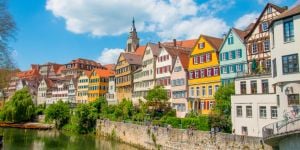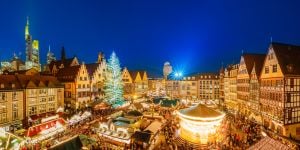Common misconceptions and clichés about life in Germany
Subscribe to the topic
Post new topic
Hello everyone,
Old clichés die hard, as the saying goes... and living in Germany can generate lots of misconceptions in the eyes of the people.
What are the most common misconceptions about the expat lifestyle in Germany?
What are the most common clichés about life in Germany in general?
Did you have a biased view of the country before moving there? What is you view now?
Thanks in advance,
Priscilla
Clichés like the trains run on time and there is a lot of bureaucracy but plenty of law and order?
The train and most public transportation systems are the envy of most places outside of Europe. Yet the Deutschebahn has some alarming trends. There are increasingly late and inconsistant. No surprise that the 3 last leaders were from the auto industry and try to run it like a hedge fund only looking at the bottom line rather than as a service provider despite the ads saying otherwise.
Over the last 20 years or so around a third of all stations have been closed. Maybe an inconvenience to people in smaller communities but those places provide a smaller profit margin. The concentration has been on the more luxurious and expensive ICE trains that ply major routes. They look sleek but have storage that fits their target market, a business man with a briefcase rather than lots of tourists with big suitcases. More trains are delayed or cancelled as money is wasted on prestige projects rather than needed infrastructure.
The ICE trains are also notorious for having their air conditioning break down if the temperature gets over 30 degrees Celsius. Over 20 years ago, many a summer went by where this would only happen on a handful of days if at all. By 2016 it was about 30 to 40 days. And the ICE trains do not have windows that open. If it gets hot and the air-conditioning goes down then they have to stop the train.
And yes, there ae a lot of regulations in Germany and while there is petty crime; serious, violent crimes are not common. But the court systems are a mess. One often has to wait 6 to 12 months (or more) to even get an initial court date. Judges are over worked and rarely prepare for cases thus many mistakes are made. This results in the majority of court decisions getting appealed to a higher court. I’ve seen for myself that even there they often make baffling decisions that contradict the laws.
So protecting your rights and getting justice whether a civil or criminal matter is very hit and miss. Even decisions of higher courts mean little beyond a particular case since the rule of precedent that is common to American law for example is almost an unheard of concept in Germany. One can only hope to have a really good lawyer and that the judge likes the looks of you rather than your opponent.
And although German police rarely shoot people, one almost never wins a case against a cop no matter what the evidence. As a witness you can be compelled to show up and testify but if the judge doesn’t like what you say, they often convict witnesses for making false testimony. Suing anyone for even the most standard thing will usually take 2 to 3 years to get through the courts as the best case scenario. A speedy trail is not seen as a right in Germany. Paradoxically, the first person to go to the police concerning a conflict is almost always in the advantage, even if they are the instigator rather than the victim.
One common cliche known all around the world is that Germany is the land of Autobahns (express ways) without speed limits.
While technically true for expressways by default, it is increasingly difficult to find a stretch that is neither signposted with a speed limit (due to perceived dangers like curvature, slope, construction, exits, etc.) or too crowded to go fast.
There is a recommendation to remain below 130 km/h and in most places on most days you'll not get much faster than that. Don't plan on renting a Porsche and driving it to its limits!
Another cliche is the beer-drinking, Lederhosen-wearing Oktoberfest.
Yes, it does exist, in Munich (there really is only one Oktoberfest, although some other cities have similar beer festivals at other times and under other names) in the last two weeks of September (despite its name).
You'll find more foreign tourists there than locals and the prevalence of Lederhosen and other "traditional" garb is a recent fashion that didn't exist in my childhood. At over EUR10 for a 1 litre mug of beer, it also isn't cheap.
The consumption of beer in Germany is on a long-term decline. Wine is increasing.
The country also has large areas of wine production, with smaller (less touristy, less commercial) wine festivals in many villages, where you're more likely to find the real Germany.
And, last not least, I have to mention Neuschwanstein:
A fairy-tale-like castle in a beautiful mountain setting that everybody has seen pictures of, it is the most visited tourist site in the whole country.
But like the Disneyland castles (which are modelled after it), it is merely a stage setting - of a romantic, opera-loving local king (whom many thought crazy, because he valued living his dreams over running the state). The inside was never completed, so after queuing for admission (1.5 hours when I visited last!) you might be disappointed by the spartan, empty rooms. A walk in the surrounding mountainside is more rewarding, with views and photo opportunities at every turn.
Germany's many "real" castles might be less scenic, but much older and more interesting. Don't give them a miss, too!
And then there is German efficiency and quality.
Many Germans tend to be perfectionists, engineers are a highly regarded profession, and any new solution (technologically or otherwise) is analysed from all angles and has to be approved by many people before it can be brought to market.
Therefore, German goods and services are generally excellent, expensive and late.
Chinese goods (shoddy, cheap and quick) flood the markets here, too, and are preferred by many Germans.
Beppi has some good points.
The lederhosen and dirndls that foreigners associate with Germany is more of an old-fashioned Bavarian tradition rarely seen in other parts of Germany in the past decades. But it has not only made a comeback for the Munich Oktoberfest but also elsewhere. The Volksfest is the Stuttgart version and contrary to clichés is THE biggest beer festival in Germany. The Munich Oktoberfest is International known and thus draws a very International audience. Stuttgart’s festival is more regional but has the advantage of having more physical space. The Theresienwiese in Munich is pretty centrally located and has no possibility to expand. I’m sure people have considered moving the Oktoberfest to a larger location but the present one has 183 years of tradition.
Since about 10 years there has been a trend to also wearing lederhosen and dirndls at the Stuttgart Volksfest to the point where it is almost expected. But it really is kind of a costume party. People can be silly and wear clothes that they would normally never wear. And foreigners who see this have their expectations fulfilled not realizing it as representative of the country as if one were to go to Disneyland and think; “yeah, this is what America is like”.
And like Beppi mentioned, Neuschwanstein castle is a disappointment inside although it’s exterior and setting are dramatic. But there are many nicer castles in Germany, some of which can be visited. Many people who make it to the Stuttgart region will visit the Hohenzollern castle by Hechingen about 60 Km south of Stuttgart.
From my experience I agree with the others’ comments (except about the court system only because I’ve never heard any clichés about that) – especially about Neuschwanstein! I have enjoyed every other castle I’ve ever seen more than that one, including ruins.
Regarding the Autobahn, just last week I attempted a 70-km drive (with two sections of "no speed limit") to get to a meeting and had to pass through Stuttgart. Normally the drive takes me an hour and 10 minutes. After 90 minutes I was half-way and my GPS told me I still had more than an hour to go because of clogged up roads. I gave up and went back home. When people tell me driving on the Autobahn must be SO much fun, I can only roll my eyes.
One cliché that hasn’t been mentioned is that Germans are cold and distant. More so than Americans, sure. Germans tend to not deal well with superficiality or small talk. I imagine Germans seem unfriendly in large cities, but I live in a small village and people are very friendly here, greeting me as we pass (total strangers) offering help, and so on. I have noticed that unfriendliness often starts with the person who ends up labeling the Germans as unfriendly. A fellow American in a café once got grouchy because she tried to order a coffee from an employee who didn’t take orders. The employee politely told the American she needs to order from our server, and the American huffed, “Fine!! Typical German!” I have never expected someone to speak English with me, and I think that helps. The other thing is that in service – for instance at a restaurant – the servers want and need to get their job done. They don’t spend time chit-chatting, and the flirting that some Americans do with waitresses doesn’t go over well here. I think that contributes to the impression that Germans are cold and distant, though I wholeheartedly disagree.
Articles to help you in your expat project in Germany
 Summer jobs in Germany
Summer jobs in GermanyThe summer season in Germany begins in June and lasts until the end of August. These three months of the year ...
 Elderly care in Germany
Elderly care in GermanyGermany may not have the sunshine and beaches of the Mediterranean or Southeast Asia, but it is among Europe's ...
 Popular neighbourhoods in Frankfurt
Popular neighbourhoods in FrankfurtFrankfurt is an international city and an important financial center in Europe, and each neighborhood has a story ...
 Buying property in Frankfurt
Buying property in FrankfurtFrankfurt has a very lively real estate market, and buying a house there is, without a doubt, a worthy long-term ...
 Connecting to the internet in Germany
Connecting to the internet in GermanyStaying connected in Germany is easy thanks to its advanced telecommunications network and the widely available ...
 Accommodation in Stuttgart
Accommodation in StuttgartStuttgart, the capital city of the Baden-Württemberg region, is one of Germany's most diverse cities, ...
 Things to do on weekdays in Frankfurt
Things to do on weekdays in FrankfurtFrankfurt is a city of culture, fun, and many contrasts, which can be seen in the different neighborhoods and the ...
 Things to do in Frankfurt alone, with your partner or with family
Things to do in Frankfurt alone, with your partner or with familyFrankfurt is a great city with plenty of places to visit, whether during the week or for a weekend. It is ...
Find more topics on the Germany forum



